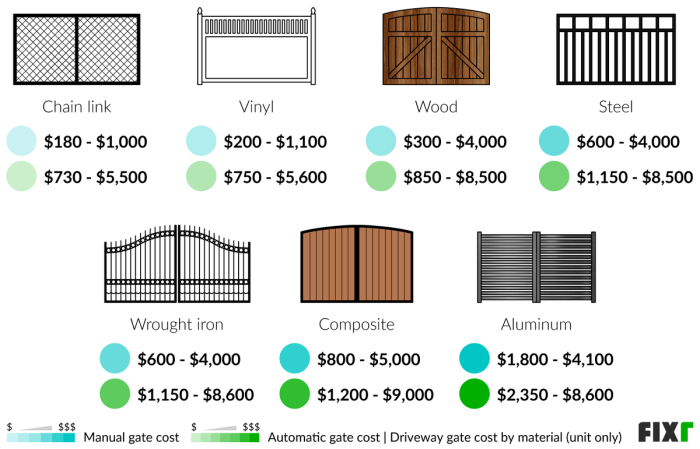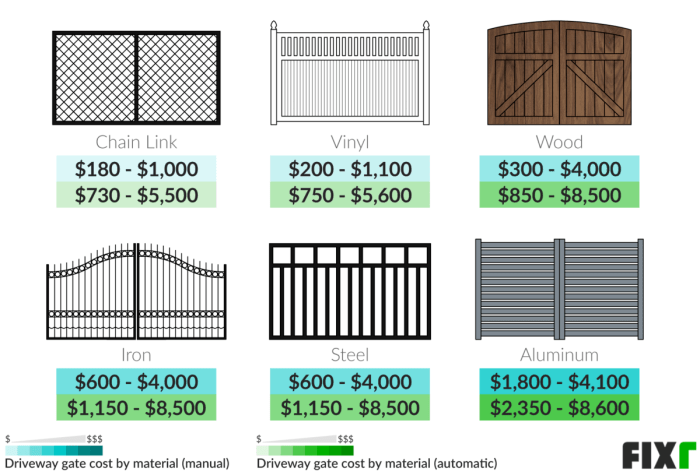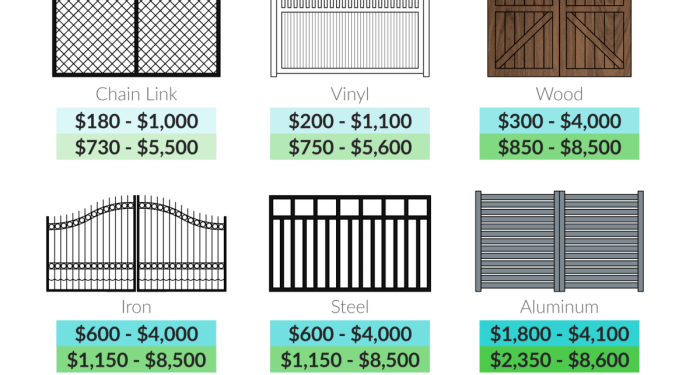Diving into the world of driveway gate cost estimator, this introduction aims to provide a detailed look at the various factors influencing costs, methods of estimation, budgeting tips, popular materials, and additional costs to consider. From materials to installation complexity, this guide covers it all in a manner that is both informative and engaging.
As we delve deeper into the realm of driveway gate cost estimation, readers will gain valuable insights into the intricacies of determining the expenses involved in installing a driveway gate.
Factors Affecting Driveway Gate Cost

When it comes to determining the cost of a driveway gate, several factors come into play that can influence the final price. Let's take a closer look at some of the key elements that affect driveway gate cost.
Materials Used for Driveway Gates
The material used for the construction of a driveway gate plays a significant role in determining its cost. Common materials for driveway gates include:
- Steel: Known for its durability and strength, steel gates tend to be more expensive due to the material's quality.
- Aluminum: A lighter and more affordable option compared to steel, aluminum gates are a popular choice for many homeowners.
- Wood: Wooden gates offer a classic and elegant look but may require more maintenance over time, impacting the overall cost.
Size of the Gate
The size of the driveway gate directly impacts the cost of installation. Larger gates require more materials and labor to install, resulting in a higher overall cost compared to smaller gates.
Additional Features
Incorporating additional features such as automation systems or security measures can also increase the cost of a driveway gate. Automated gates with remote control capabilities or advanced security features like cameras or intercoms will add to the total cost of the project.
Gate Styles
Different styles of driveway gates, such as sliding gates or swing gates, can also affect the overall cost. Sliding gates are often more expensive due to their complex installation process, while swing gates may be a more budget-friendly option.Consider these factors when planning for a driveway gate installation to ensure you get a gate that meets your needs while staying within your budget.
Cost Estimation Methods
When it comes to estimating the cost of driveway gates, several factors need to be considered to provide an accurate quote. Let's delve into the breakdown of the cost estimation process for driveway gates, including labor costs and installation complexity.
Breakdown of Cost Estimation Process
- Material Costs: The type of material used for the driveway gate, such as wrought iron, aluminum, or wood, will significantly impact the overall cost.
- Size and Design: The size and design intricacy of the gate will also affect the cost, as larger gates or custom designs may require more materials and labor.
- Automation Features: If you opt for automated features like a gate opener or intercom system, this will add to the overall cost.
- Additional Features: Extras like decorative elements, lighting, or security features will increase the total cost of the driveway gate.
Role of Labor Costs
Labor costs play a crucial role in determining the overall estimate for a driveway gate. The complexity of the installation, including site preparation, gate assembly, and automation setup, will impact the labor costs. Additionally, the experience and expertise of the installation team will also influence the labor costs involved.
Installation Complexity
The complexity of the installation process is a key factor in determining the cost of a driveway gate. Factors such as the terrain of the property, existing structures that may need to be worked around, and the need for electrical wiring for automated features will all contribute to the overall complexity of the installation.
More complex installations will require additional time and expertise, resulting in higher costs for the project.
Budgeting Tips for Driveway Gate Installation
Setting a realistic budget for driveway gate installation is crucial to ensure you get a quality product that meets your needs without breaking the bank. Here are some tips to help you budget effectively and save costs without compromising on quality.
Setting a Realistic Budget
When setting a budget for your driveway gate installation, consider factors such as the size of the gate, material, automation options, and installation costs. Research the average costs in your area to get an idea of how much you should allocate for the project.
It's important to be realistic about your budget to avoid any unexpected expenses along the way.
Cost-Saving Strategies
- Consider opting for a simpler design or a standard size gate to save on material costs.
- DIY installation can save you money, but make sure you have the necessary skills and tools to do it correctly.
- Compare prices from multiple suppliers and contractors to find the best deal without compromising on quality.
- Look for discounts or promotions from suppliers to save on material costs.
- Regular maintenance and upkeep can help prolong the life of your driveway gate, saving you money on repairs or replacements in the long run.
Importance of Getting Multiple Quotes
Getting multiple quotes from different suppliers and contractors is essential to ensure you are getting a fair price for your driveway gate installation. By comparing quotes, you can also negotiate better deals and possibly uncover hidden costs that may not have been included in a single quote.
This way, you can make an informed decision based on accurate cost comparisons and choose the option that fits your budget and requirements best
Popular Driveway Gate Materials

When it comes to choosing the right material for your driveway gate, there are several options available, each with its own set of characteristics, durability, maintenance requirements, and cost implications. Here, we will discuss the most popular driveway gate materials: wrought iron, aluminum, wood, and steel.
Wrought Iron
Wrought iron is a classic and elegant choice for driveway gates. It is known for its durability and strength, making it a popular option for security gates. Wrought iron gates are also highly customizable, allowing for intricate designs and patterns.
However, wrought iron gates require regular maintenance to prevent rust and corrosion, which can add to the overall cost of ownership.
Aluminum
Aluminum is a lightweight and cost-effective option for driveway gates. It is resistant to rust and corrosion, making it a low-maintenance choice. Aluminum gates are available in a variety of styles and colors, offering versatility in design. While aluminum gates may not be as strong as wrought iron, they are still a durable option for residential driveways.
Wood
Wooden driveway gates provide a natural and rustic look to any property. Wood is a versatile material that can be stained or painted to match the aesthetics of your home. However, wood gates are more susceptible to weather damage and require regular maintenance, such as sealing and painting, to prolong their lifespan.
The cost of maintenance should be factored into the overall cost of a wooden driveway gate.
Steel
Steel is a strong and durable material commonly used for driveway gates. Steel gates offer security and longevity, making them a popular choice for commercial properties. While steel gates are more expensive than some other materials, they require minimal maintenance and can withstand harsh weather conditions.
The initial cost of a steel driveway gate may be higher, but the long-term durability and security benefits make it a worthwhile investment.
Additional Costs to Consider

When budgeting for driveway gate installation, it's crucial to consider not only the upfront costs but also the potential additional expenses that may arise throughout the process. These hidden costs can significantly impact your overall budget and should not be overlooked.
In addition to the initial gate cost estimation, homeowners need to account for ongoing maintenance expenses, permit costs, and any required upgrades to existing structures.
Hidden Costs During Installation
- Unexpected ground conditions: If the installation site has challenging terrain or soil conditions, additional groundwork may be needed, leading to increased labor costs.
- Electrical wiring and power source: Installing a driveway gate often requires electrical wiring for automation systems, which may necessitate hiring an electrician for proper installation.
- Access control systems: Depending on the complexity of the access control system desired, additional costs for keypads, remote controls, or intercom systems may arise.
Ongoing Maintenance Expenses
- Regular servicing: To ensure the longevity and proper functioning of your driveway gate, routine maintenance such as lubrication, adjustments, and inspections should be factored into the budget.
- Replacement parts: Over time, components of the gate may wear out and require replacement, such as hinges, motors, or control panels, adding to the maintenance costs.
- Potential repairs: In case of damage from accidents, weather, or wear and tear, repair costs for the gate structure or automation system can be significant.
Permit Costs and Upgrades
- Permit fees: Before installing a driveway gate, homeowners may need to obtain permits from local authorities, which come with associated fees that vary depending on the location.
- Structural upgrades: If the existing driveway or entryway does not meet the requirements for gate installation, modifications or enhancements may be necessary, such as widening the entrance or reinforcing pillars.
- Landscape adjustments: Landscaping around the gate area may need to be altered to accommodate the installation, which can involve costs for tree removal, grading, or planting new vegetation.
Last Word
In conclusion, understanding the nuances of driveway gate cost estimation is essential for anyone looking to embark on a gate installation project. By considering factors such as materials, size, and additional features, individuals can make informed decisions that align with their budget and preferences.
This comprehensive guide has shed light on the various aspects of driveway gate costs, providing a holistic view for readers to navigate the process effectively.
Query Resolution
What are the most common materials used for driveway gates?
Common materials include wrought iron, aluminum, wood, and steel.
How does the size of the gate impact the overall cost?
The larger the gate, the higher the cost due to increased materials and labor required.
What are some budgeting tips for driveway gate installation?
Setting a realistic budget, seeking multiple quotes, and exploring cost-saving strategies are key tips.
Are there hidden costs to consider during driveway gate installation?
Hidden costs may include permit fees, maintenance expenses, and necessary upgrades to existing structures.
How do different materials influence the overall cost of a driveway gate?
Materials like wrought iron and steel tend to be more expensive upfront but require less maintenance, impacting long-term costs.










